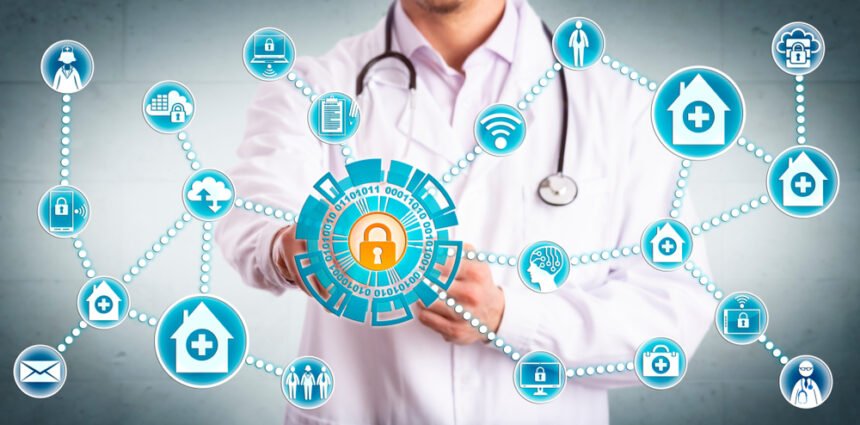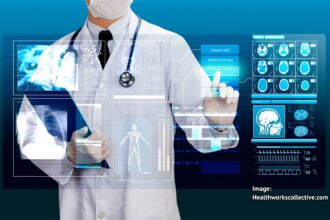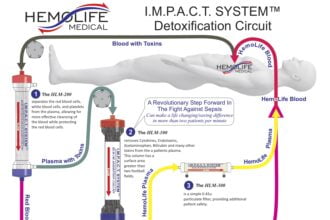The Evolution of AI in Healthcare: A Leap Towards Precision and Efficiency
AI technology has led to some massive changes in the healthcare sector. Analysts estimate that healthcare companies spent $11 billion on AI in 2021 and that figure is continuing to grow.
The pharmaceutical sector is going through a complete AI transformation. The democratization of healthcare, decision-making, and patient data is also a tremendous force that AI is unleashing on our industry. One example of the first drive is that AI will power diagnostics and precision medicine that will be better at identifying diseases earlier and more accurately and then delivering more effective treatments to people around the globe. This is just one of the many benefits of AI in healthcare.
The Critical Intersection: Cybersecurity in the AI-Driven Healthcare Landscape
Along with the increased use of AI comes more complexity for the cybersecurity involved with healthcare. With the digitization of information, both about the patients and the healthcare processes, comes a new vulnerability and the need for a robust cyber security mechanism to defend patient information and operational hospital process attacks. Being able to keep information safe, an essential part of preserving patient trust, is a fundamental prerequisite for delivering healthcare. This is an important responsibility, and as technology evolves, we will embrace a foolproof combination of technology, people, and processes to create a robust foundation for any new technological changes. We are actively working with this notion that we implement an effective cybersecurity mechanism that will ensure no risk or danger of a cyberattack on any healthcare operations.
Collaborative Strategies for Secure AI Implementation in Healthcare
For instance, a healthy cybersecurity ecosystem at the core of AI-powered healthcare is crucial for the successful implementation of AI in fundamental healthcare services. Our vision is to provide a complementarity between AI innovation and cybersecurity by letting AI achieve its full potential using secure backbones, which will naturally allow its development and implementation. Our vision is open and multidimensional, as it is made up of technical measures as well as organizational good practices and continuous improvement of methods to deliver security in the information age.
Pioneering AI Applications in Healthcare: Opportunities and Cybersecurity Implications
We can further zoom into the healthcare space for the rest of the journey to elaborate on the roles of AI in the direct care of patients, coupled with the new cybersecurity imperatives triggered by these solutions, including AI-based medical devices and predictive analytics.
Ethical AI Development: Ensuring Equity and Security
As hackers become ever more innovative and inventive in finding ways to exploit AI vulnerabilities, AI developers must look ever more ingeniously to ethically develop AI systems so that they are just and fair in their operation, to ensure that AI is transparent so that it will not introduce bias into healthcare decision making, and that it functions in a way that improves the accessibility of healthcare to all. Whether it be cybersecurity, healthcare justice, global security, human rights, or achieving social justice, the capacity to address these social and societal challenges will be a byproduct of an emergent vision that puts ethics at the core of AI development. This is our collective responsibility: to commit to a source of ethically developed AI that will ultimately deliver healthcare to all in a more fair, secure, and respectful form than our own imperfect, individual human nature is capable of today.
Predictive Analytics: A Double-Edged Sword
Predictive analytics in healthcare leverages AI to forecast patient health outcomes, aiding in early intervention and personalized care plans. This is a huge step forward, but it also requires a lot of data protection. Patient data collated for analysis has to be protected from unsafe access and breaches. There is a need for high-security through encryption and access controls.
AI-Driven Medical Devices: Revolutionizing Treatment with Security in Mind
Advanced devices using AI are already employed in medicine – for instance, as smart insulin pumps. However, they vary significantly in their cybersecurity: not only can they be exploited as attack points, they can become attack paths.
In this context, ensuring robust network security becomes paramount, as it underpins the safety and reliability of these AI-driven medical devices. Adopting cutting-edge network solutions offers a foundational layer of protection, safeguarding patient data and device functionality against cyber threats. Such measures are essential in maintaining trust in the digital transformation of healthcare.
Leveraging Blockchain for Enhanced Security in Healthcare
With the above challenges in mind, blockchain can bring healthcare into a new era of cybersecurity. The secure decentralized storage and shareability of data, with blockchain-based priority, helps to minimize the chance of data breaches and maximize the chance of data integrity. This paves the way for a new standard of cybersecurity in healthcare.
The Role of Continuous Education and Cybersecurity Awareness
Besides these technological developments, we underline the critical importance of providing healthcare professionals with a constant education and awareness path because a cybersecurity issue is not merely a technical issue. It’s a matter of culture. Biannual or annual training programs and awareness campaigns can really make a difference in the mindset of healthcare staff, enabling them to identify cyber threats and fostering best practices for data protection, thus staying constantly proactive on cyber risks.
Conclusion: Forging a Future of Secure, AI-Enabled Healthcare
Zero trust for zero trust: an endless cycle to cope with innovation is a long series of compromises in everyday life. Thanks to the use of intelligent technology – artificial intelligence (AI) – innovation in healthcare has skyrocketed, pushing our imaginations to ever-new horizons: our future will see an increase of AI devices that can assist doctors or predict patients’ health, with numerous forms of artificial intelligence in between (think sensors and exoskeletons). From next-generation biomonitors to AI-driven medical devices, the list of new cybersecurity issues is endless.
Paving future pathways using a culture of predictive and resilient readiness and response creates a technology-powered yet hacker-resilient healthcare ecosystem of the future. Together, we move forward to ensure a future where safe healthcare innovation emerges as an integral part of high healthcare service within a secure and transparent healthcare digital environment.









